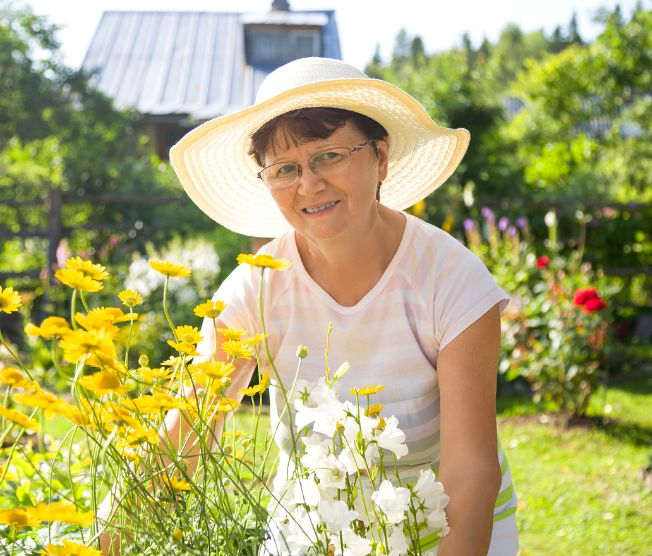 Prolonged exposure to high temperatures can lead to heat exhaustion, dehydration or heat stroke, especially in seniors. With age, the body becomes less effective at regulating its internal temperature. Coupled with chronic health conditions and medication side effects, seniors may find it hard to keep cool or sweat excessively, leading to heat-related illnesses.
Prolonged exposure to high temperatures can lead to heat exhaustion, dehydration or heat stroke, especially in seniors. With age, the body becomes less effective at regulating its internal temperature. Coupled with chronic health conditions and medication side effects, seniors may find it hard to keep cool or sweat excessively, leading to heat-related illnesses.
Understand how older adults can stay safe, while still enjoying the summer weather.
Warm-Weather Concerns for Seniors
Seniors have higher risks for the following conditions:
- Heat cramps, when you experience tightness or spasms in your extremities after exerting yourself in high temperatures.
- Dizziness or heat syncope, which can also occur in response to exertion in high temperatures.
- Heat exhaustion, when you suddenly feel thirsty and your body can’t seem to stay cool. You may also feel your pulse rise, you start sweating or your skin feels clammy.
- Heat rash, characterized by small blisters and a burning, itching or prickly sensation in the affected area.
- Heat stroke, during which the body’s internal temperature exceeds 104 degrees, you’re at increased risk for fainting and experience a sudden change in pulse.
- Sunburn, which may also result in blistering and fever-like symptoms for older adults.
- Heat edema or swelling around your ankles and feet in response to high temperatures.
These factors are exacerbated by age-related changes, like thinning skin and weakened muscles, in addition to:
- Cardiovascular issues
- Kidney disease
- Select medications, including diuretics, sedatives and blood pressure medications
- Medication side effects
- Lifestyle factors, including being overweight, drinking alcohol and not having access to air conditioning or another cooling method
How Seniors Can Manage the Heat
Seniors don’t have to spend all day indoors but should take the following precautions before heading outside:
- Stay hydrated. Continue to drink fluids including water, sports drinks and fruit juices but avoid caffeine and alcohol, which can both encourage dehydration. You may need to drink more than usual to stay properly hydrated in warm weather.
- Keep cool. Modify your home with air conditioning, fans or by closing the shades to prevent the interior from getting hot. If you don’t have access to cooling devices, visit a cooling center or temperature-controlled place like the library or senior center.
- Know how to dress for the weather. Put on a broad-spectrum sunscreen, wear light-colored, lightweight clothing, a full-brimmed hat and sunglasses to limit exposure. Be prepared to reapply sunscreen every couple of hours.
- Limit physical activity outdoors. Avoid strenuous exercise, long walks and yardwork in hot weather conditions. Schedule these activities for the morning or evening.
- Learn effective ways to cool down. For older adults, consider a cold shower or bath. You can also wipe down your skin with a cool, damp washcloth.
- Discuss health concerns with your doctor. Understand if your medications make you more sensitive to high temperatures and sun exposure.
- Reduce sources of heat. Turn off all sources of heat in your home, including the stovetop and oven, which will increase the temperature of your home.
- Check on your neighbors. Especially if you have elderly neighbors, make sure everyone has sufficient food and water, a cool place to relax and electricity for air conditioning or necessary medical equipment.
- Know the signs of heat-related illness. If you suddenly feel dizzy, exhausted or dehydrated, head indoors or to a shaded area to cool off with a cold drink.
Are you concerned about a loved one’s susceptibility to heat-related illnesses? Contact the medical team at West Hartford Health & Rehabilitation Center to learn about our services.
« When Should Older Adults Stop Driving?

